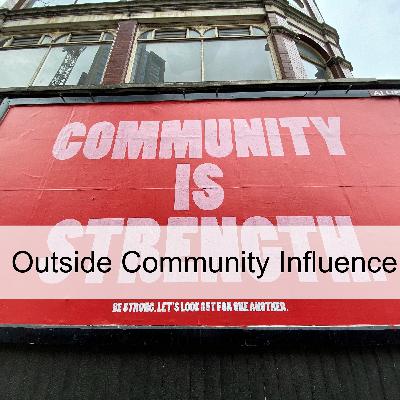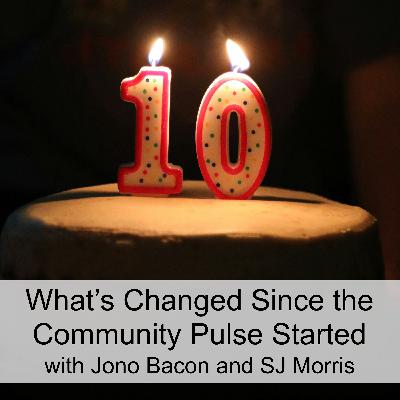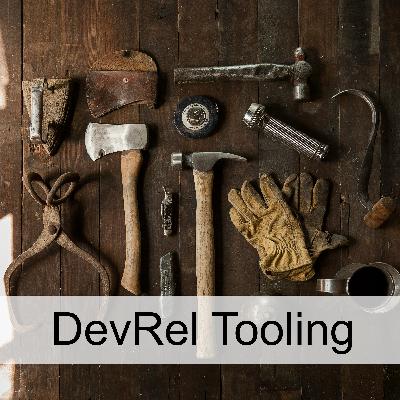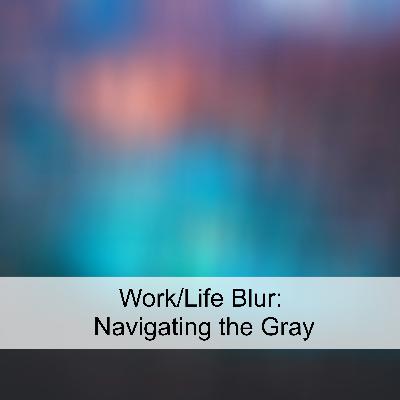Bouncing from DevRel (Ep 89)
Description
In this episode, the hosts discuss the evolving career paths of Developer Relations (DevRel) professionals, focusing on those who have transitioned out of DevRel or are contemplating such a move. Co-hosts PJ Haggerty, Mary Thengvall, Wesley Faulkner, and Jason Hand engage with guests Taylor Barnett-Torabi and Matt Broberg, who share their experiences with leaving DevRel and exploring new roles. The episode touches on themes like career shifts, identity, burnout, and the skills that are transferable to new positions, particularly in product management.
Guest Introductions:
Taylor Barnett-Torabi reflects on her nine years in DevRel, with roles spanning product marketing, support, and engineering. After a recent layoff, she is now exploring product management roles, particularly those involving external developers.
Matt Broberg, with 15 years of experience, shifted from DevRel to product management at Target, citing personal reasons like starting a family and the exhaustion from constant travel. He discusses his transition into a more structured product management role where he found more clarity and stability.
Co-Hosts’ Perspectives:
PJ Haggerty opens the discussion by noting that the definition of DevRel has always been fluid and constantly evolving. He reflects on how many professionals in DevRel are required to wear multiple hats, balancing technical work, marketing, sales, and community engagement. For many, this lack of clarity in job expectations leads to burnout. PJ recognizes that DevRel professionals are often caught between the pressures of representing their companies, managing community relationships, and working with other departments, which can make the role unsustainable.
Mary Thengvall adds to the conversation, discussing the challenges of defining clear DevRel roles. She explains that with such a wide range of expectations, professionals can feel disconnected from their core mission. Mary encourages DevRel professionals to think about their career trajectory and how they want their job to align with their personal life and passions. She also underscores the importance of self-awareness and recognizing when it's time for a change, highlighting that many DevRel professionals possess transferable skills that can help them pivot to roles like product management.
Wesley Faulkner comments on the evolving nature of DevRel and the burnout many experience, especially given the expectations that come with travel, content creation, and event planning. He shares his perspective that, as the industry matures, many DevRel professionals may feel they have "graduated" from the role and are ready for a new challenge. Wesley echoes the sentiment that DevRel professionals may naturally move into product management or similar positions due to their deep involvement with engineering teams and the product development process.
Jason Hand brings his unique perspective as someone who has also been part of the DevRel space for years. He highlights that many people in DevRel, himself included, end up working more closely with product teams than marketing teams, which often leads to a natural progression toward product management. Jason adds that, in his own experience, the role of DevRel can be exhilarating but exhausting. He acknowledges the ups and downs, including the excitement of community building and the frustration that can come with trying to balance so many roles within one job.
Jason also provides a thoughtful commentary on the shifting expectations of the DevRel community. He shares his personal experiences with burnout from events like DevOpsDays Rockies, where he was involved in organizing and noticed the increasing complexity and demands of running large-scale community events. For Jason, this evolution mirrored his growing awareness that DevRel, as it was previously structured, wasn’t sustainable long-term. He is now seeking a role that aligns with his current life stage, acknowledging that the changing landscape of DevRel has influenced his own career trajectory.
Transitioning Out of DevRel:
Matt’s Journey: Matt’s transition from DevRel was rooted in a personal desire for less travel and more stability after starting a family. He also noted that DevRel, which often involves explaining the role to others, became less appealing. The constant juggling of multiple responsibilities without a clear focus was exhausting. Moving into product management, where the role is more defined, gave Matt the clarity and focus he sought. He explains that product management, while still requiring cross-functional collaboration, allowed him to focus on building and scaling products rather than explaining what he did all the time.
Taylor’s Journey: Taylor, after a layoff, reflected on her long-term career goals and concluded that DevRel was not something she wanted to do indefinitely. She had already worn many hats—product marketing, support, and product management—which led her to explore product management as a career option. Taylor admits that transitioning away from DevRel was a challenging decision, but after engaging in various product roles, she realized that she was already performing the duties of a PM without the official title. Her journey also highlighted the need to redefine what success looks like in a new role, which was a common theme throughout the episode.
Co-Hosts’ Views on Career Transitions:
Wesley emphasizes the importance of knowing what parts of DevRel you excel at and how that can guide a future career shift. He mentions that many DevRel professionals already possess a solid understanding of product development, community engagement, and customer feedback—all skills that translate well into roles like product management or engineering.
Mary agrees and discusses the importance of defining your boundaries and expectations when considering a career shift. She acknowledges that DevRel professionals may want more structure and clarity in their roles, which is often found in product management or engineering.
PJ reflects on the ever-changing nature of job descriptions in DevRel. He acknowledges that the role is often misdefined, leading to confusion about what DevRel actually entails. PJ stresses the importance of setting clear parameters for oneself when looking to transition into another role and maintaining transparency during the interview process. He encourages listeners to focus on their strengths and communicate their career goals clearly to employers.
The Role of Networking and Relationships: Both Matt and Taylor emphasize the value of networking and building relationships throughout their careers. Taylor talks about the importance of leveraging her network, including people who had successfully transitioned into product management, to gain insight into the process. She also mentions that her personal website, where she outlined her career goals and what she was looking for, helped clarify her intentions to potential employers.
Co-Hosts’ Takeaways:
Wesley emphasizes the need for professionals to assess their skills, passions, and long-term career goals. He encourages those considering a career shift to find roles that align with their interests and offer the opportunity for growth.
Jason adds that, for many DevRel professionals, the transition to product management feels like a natural evolution due to the similarities between the roles. He notes that despite the changes, he still finds the core of DevRel—community engagement and helping developers—appealing, and that the landscape continues to shift, making it important for individuals to adapt accordingly.
Final Thoughts on Returning to DevRel: As the episode wraps up, Matt shares that, for now, he is content in his product management role and would not return to DevRel, even if presented with a job offer. However, he acknowledges that roles within DevRel vary greatly, and he wouldn't rule out returning if the right opportunity arose. Taylor, meanwhile, is open to returning to DevRel but only if the role is a better fit for her personal and professional goals, including avoiding burnout.
Conclusion: The episode concludes with a conversation about how DevRel professionals are increasingly taking control of their career trajectories. They are setting clearer boundaries, exploring roles outside of DevRel, and finding new ways to apply their skills in product management, engineering, and other fields. The key takeaway is the importance of understanding personal goals, being clear about what you want, and using the skills honed in DevRel to explore new and fulfilling career paths.
Key Words and Themes:
Keywords:
DevRel
Product Management (PM)
Career Transition
Burnout
Role Clarity
Self-Awareness
Networking
Product Marketing
Skills Transfer
Community Building
Job Titles
Travel
Work-Life Balance
Personal Motivation
Identity Shift
Themes:
- The Evolution and Ambiguity of DevRel Roles:
- The constantly changing expectations and definitions of DevRel roles, which contribute to career shifts.
- The importance of clarity in defining DevRel responsibilities to avoid burnout.
- Burnout and Work-Life Balance:
- How burnout, especially from constant travel and shifting roles, leads DevRel professionals to explore other career opportunities.
- The impact of personal life changes (e.g., starting a family) on career decisions.
- Transferable S




















